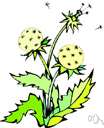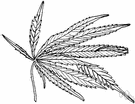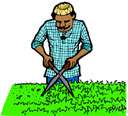weed
(redirected from weedlike)Also found in: Thesaurus, Medical, Encyclopedia.
weed 1
(wēd)n.
1. A plant considered undesirable, unattractive, or troublesome, especially one that grows where it is not wanted and often grows or spreads fast or takes the place of desired plants.
2. An aquatic plant or alga, especially seaweed.
3. Something considered useless, detrimental, or worthless.
4. Slang
a. Tobacco.
b. A cigarette.
c. Marijuana.
v. weed·ed, weed·ing, weeds
v.tr.
1. To clear of weeds: weeded the flowerbeds.
2. To remove (weeds). Often used with out: weed out dandelions.
3. To eliminate as unsuitable or unwanted. Often used with out: weed out unqualified applicants.
v.intr.
To remove weeds.
[Middle English, from Old English wēod, herb, grass, weed.]
weed 2
(wēd)n.
1. A token of mourning, as a black band worn on a man's hat or sleeve.
2. weeds The black mourning clothes of a widow.
3. often weeds Archaic An article of clothing; a garment.
[Middle English wede, garment, from Old English wǣd.]
American Heritage® Dictionary of the English Language, Fifth Edition. Copyright © 2016 by Houghton Mifflin Harcourt Publishing Company. Published by Houghton Mifflin Harcourt Publishing Company. All rights reserved.
weed
(wiːd)n
1. (Botany) any plant that grows wild and profusely, esp one that grows among cultivated plants, depriving them of space, food, etc
2. (Recreational Drugs) slang
a. the weed tobacco
b. marijuana
3. informal a thin or unprepossessing person
4. (Horse Racing) an inferior horse, esp one showing signs of weakness of constitution
vb
(Botany) to remove (useless or troublesome plants) from (a garden, etc)
[Old English weod; related to Old Saxon wiod, Old High German wiota fern]
ˈweeder n
ˈweedless adj
ˈweedˌlike adj
weed
(wiːd)n
(Clothing & Fashion) rare a black crepe band worn to indicate mourning. See also weeds
[Old English wǣd, wēd; related to Old Saxon wād, Old High German wāt, Old Norse vāth]
Collins English Dictionary – Complete and Unabridged, 12th Edition 2014 © HarperCollins Publishers 1991, 1994, 1998, 2000, 2003, 2006, 2007, 2009, 2011, 2014
weed1
(wid)n.
1. an undesirable plant growing wild, esp. one growing on cultivated ground to the disadvantage of a crop, lawn, or flower bed.
2. something unattractive, wretched, or useless, esp. a horse unfit for breeding purposes.
3. Informal. a cigarette or cigar.
4. the weed,
v.t. a. Informal. tobacco.
b. Slang. marijuana.
5. to free from weeds or troublesome plants: to weed a garden.
6. to root out or remove (a weed or weeds), as from a garden (often fol. by out).
7. to remove as being undesirable, inefficient, or superfluous (often fol. by out): weeded out inexperienced players.
8. to rid (something) of undesirable or superfluous elements.
v.i. 9. to remove weeds or the like.
[before 900; Middle English wede, Old English wēod, c. Old Saxon wiod; akin to Old High German wiota fern]
weed2
(wid)n.
1. weeds, mourning garments: widow's weeds.
2. a mourning band of black crepe or cloth, as worn on a man's coat sleeve.
3. Often, weeds.Archaic.
a. a garment: clad in rustic weeds.
b. clothing.
[before 900; Middle English wede, Old English wǣd, (ge)wǣde garment, clothing, c. Old Saxon wād, gewādi, Old High German wāt, gewāti, Old Norse vāth]
Random House Kernerman Webster's College Dictionary, © 2010 K Dictionaries Ltd. Copyright 2005, 1997, 1991 by Random House, Inc. All rights reserved.
weed
Past participle: weeded
Gerund: weeding
| Imperative |
|---|
| weed |
| weed |
Collins English Verb Tables © HarperCollins Publishers 2011
ThesaurusAntonymsRelated WordsSynonymsLegend:
Switch to new thesaurus
| Noun | 1. |  weed - any plant that crowds out cultivated plants weed - any plant that crowds out cultivated plantsAgrostemma githago, corn campion, corn cockle, crown-of-the-field - European annual having large trumpet-shaped reddish-purple flowers and poisonous seed; a common weed in grainfields and beside roadways; naturalized in America knawe, knawel, Scleranthus annuus - widely distributed low-growing Eurasian herb having narrow leaves and inconspicuous green flowers corn spurrey, corn spurry, Spergula arvensis - small European weed with whorled leaves and white flowers sand spurry, sea spurry, Spergularia rubra - prostrate weedy herb with tiny pink flowers; widespread throughout Europe and Asia on sand dunes and heath and coastal cliffs; naturalized in eastern North America carpetweed, Indian chickweed, Molluga verticillata - annual prostrate mat-forming weed having whorled leaves and small greenish-white flowers; widespread throughout North America alligator grass, alligator weed, Alternanthera philoxeroides - prolific South American aquatic weed having grasslike leaves and short spikes of white flowers; clogs waterways with dense floating masses Barbarea vulgaris, rockcress, rocket cress, Sisymbrium barbarea, yellow rocket - noxious cress with yellow flowers; sometimes placed in genus Sisymbrium Erysimum cheiranthoides, wormseed mustard - slender yellow-flowered European mustard often troublesome as a weed; formerly used as an anthelmintic jointed charlock, Raphanus raphanistrum, runch, wild radish - Eurasian weed having yellow or mauve or white flowers and podlike fruits pennycress - any of several plants of the genus Thlaspi ambrosia, bitterweed, ragweed - any of numerous chiefly North American weedy plants constituting the genus Ambrosia that produce highly allergenic pollen responsible for much hay fever and asthma thistle - any of numerous plants of the family Compositae and especially of the genera Carduus and Cirsium and Onopordum having prickly-edged leaves Barnaby's thistle, Centaurea solstitialis, yellow star-thistle - European weed having a winged stem and hairy leaves; adventive in the eastern United States Canadian fleabane, Conyza canadensis, Erigeron canadensis, horseweed, fleabane - common North American weed with linear leaves and small discoid heads of yellowish flowers; widely naturalized throughout temperate regions; sometimes placed in genus Erigeron Erechtites hieracifolia, fireweed - an American weedy plant with small white or greenish flowers Hieracium praealtum, king devil, yellow hawkweed - European hawkweed introduced into northeastern United States; locally troublesome weeds California dandelion, capeweed, gosmore, Hypochaeris radicata, cat's-ear - European weed widely naturalized in North America having yellow flower heads and leaves resembling a cat's ears Parthenium hysterophorus - tropical American annual weed with small radiate heads of white flowers; adventive in southern United States bitterweed, bristly oxtongue, oxtongue, Picris echioides, bugloss - widespread European weed with spiny tongue-shaped leaves and yellow flowers; naturalized in United States Hieracium aurantiacum, orange hawkweed, Pilosella aurantiaca - European hawkweed having flower heads with bright orange-red rays; a troublesome weed especially as naturalized in northeastern North America; sometimes placed in genus Hieracium Senecio doublasii, threadleaf groundsel - bluish-green bushy leafy plant covered with close white wool and bearing branched clusters of yellow flower heads; southwestern United States; toxic to range livestock benweed, ragweed, ragwort, Senecio jacobaea, tansy ragwort - widespread European weed having yellow daisylike flowers; sometimes an obnoxious weed and toxic to cattle if consumed in quantity groundsel, Senecio vulgaris - Eurasian weed with heads of small yellow flowers cocklebur, cockle-bur, cockleburr, cockle-burr - any coarse weed of the genus Xanthium having spiny burrs nettle - any of numerous plants having stinging hairs that cause skin irritation on contact (especially of the genus Urtica or family Urticaceae) tumbleweed - any plant that breaks away from its roots in autumn and is driven by the wind as a light rolling mass madnep, wild parsnip - biennial weed in Europe and America having large pinnate leaves and yellow flowers and a bitter and somewhat poisonous root; the ancestor of cultivated parsnip cultivated plant - plants that are grown for their produce |
| 2. | weed - a black band worn by a man (on the arm or hat) as a sign of mourning band - a thin flat strip of flexible material that is worn around the body or one of the limbs (especially to decorate the body) | |
| 3. |  weed - street names for marijuana weed - street names for marijuana | |
| Verb | 1. |  weed - clear of weeds; "weed the garden" weed - clear of weeds; "weed the garden" remove, take away, withdraw, take - remove something concrete, as by lifting, pushing, or taking off, or remove something abstract; "remove a threat"; "remove a wrapper"; "Remove the dirty dishes from the table"; "take the gun from your pocket"; "This machine withdraws heat from the environment" stub - clear of weeds by uprooting them; "stub a field" |
Based on WordNet 3.0, Farlex clipart collection. © 2003-2012 Princeton University, Farlex Inc.
weed
weed something or someone out
verb eliminate, remove, shed, get rid of, eradicate, dispense with, uproot, root out, separate out, extirpate He is keen to weed out any applicants whom he believes to be frauds.
Collins Thesaurus of the English Language – Complete and Unabridged 2nd Edition. 2002 © HarperCollins Publishers 1995, 2002
Translations
عُشْب ضار أو بَرّيعُشْبَةٌ ضَارَّةعشبة ضارةيُزيل أو يَقْتَلِع
pleveltráva
ukrudtukrudtsplantefjerne ukrudttang
rikkaruohoruoho
korov
gyomgyomlálkigyomlálgaz
illgresireyta illgresi
雑草雑草を抜くクサたばこヒヨッコ
김매다매다김잡초
atsijotiherbicidaspiktžolėravėti
nezāleravēt
iarbă
burinaplieťvyplieť
pletiplevel
ogräs
วัชพืช
yabani otyabanî otyabanî ottan temizlemek
cỏ dại
weed
[wiːd]A. N
1. → mala hierba f, hierbajo m; (= waterweed) → alga f
the garden was full of weeds → el jardín estaba lleno de malas hierbas or hierbajos
the garden was full of weeds → el jardín estaba lleno de malas hierbas or hierbajos
2. (= person) → pelele m
3. the weed (= tobacco) → el tabaco
4. (= marihuana) → hierba f
B. VT [+ flowerbed] → desherbar
C. VI → desherbar
Collins Spanish Dictionary - Complete and Unabridged 8th Edition 2005 © William Collins Sons & Co. Ltd. 1971, 1988 © HarperCollins Publishers 1992, 1993, 1996, 1997, 2000, 2003, 2005
Collins English/French Electronic Resource. © HarperCollins Publishers 2005
weed
vi → jäten
Collins German Dictionary – Complete and Unabridged 7th Edition 2005. © William Collins Sons & Co. Ltd. 1980 © HarperCollins Publishers 1991, 1997, 1999, 2004, 2005, 2007
weed
[wiːd]1. n (plant) → erbaccia; (weak person) → tipo/a allampanato/a
2. vt (flower bed) → diserbare
weed out vt + adv (fig) → eliminare
Collins Italian Dictionary 1st Edition © HarperCollins Publishers 1995
weed
(wiːd) noun any wild plant, especially when growing among cultivated plants or where it is not wanted. The garden is full of weeds.
verb to remove weeds (from). to weed the garden.
ˈweedkiller noun a chemical etc used to kill weeds.
weed out to remove (things which are unwanted) from a group or collection.
Kernerman English Multilingual Dictionary © 2006-2013 K Dictionaries Ltd.
weed
→ عُشْبَةٌ ضَارَّة plevel tang Unkraut ζιζάνιο mala hierba rikkaruoho mauvaise herbe korov erbaccia 雑草 잡초 onkruid ugras chwast erva daninha сорняк ogräs วัชพืช yabani ot cỏ dại 野草Multilingual Translator © HarperCollins Publishers 2009
weed
(fam) marihuana, mariguana (Mex), hierba (fam), mota (Mex, CA; fam)English-Spanish/Spanish-English Medical Dictionary Copyright © 2006 by The McGraw-Hill Companies, Inc. All rights reserved.